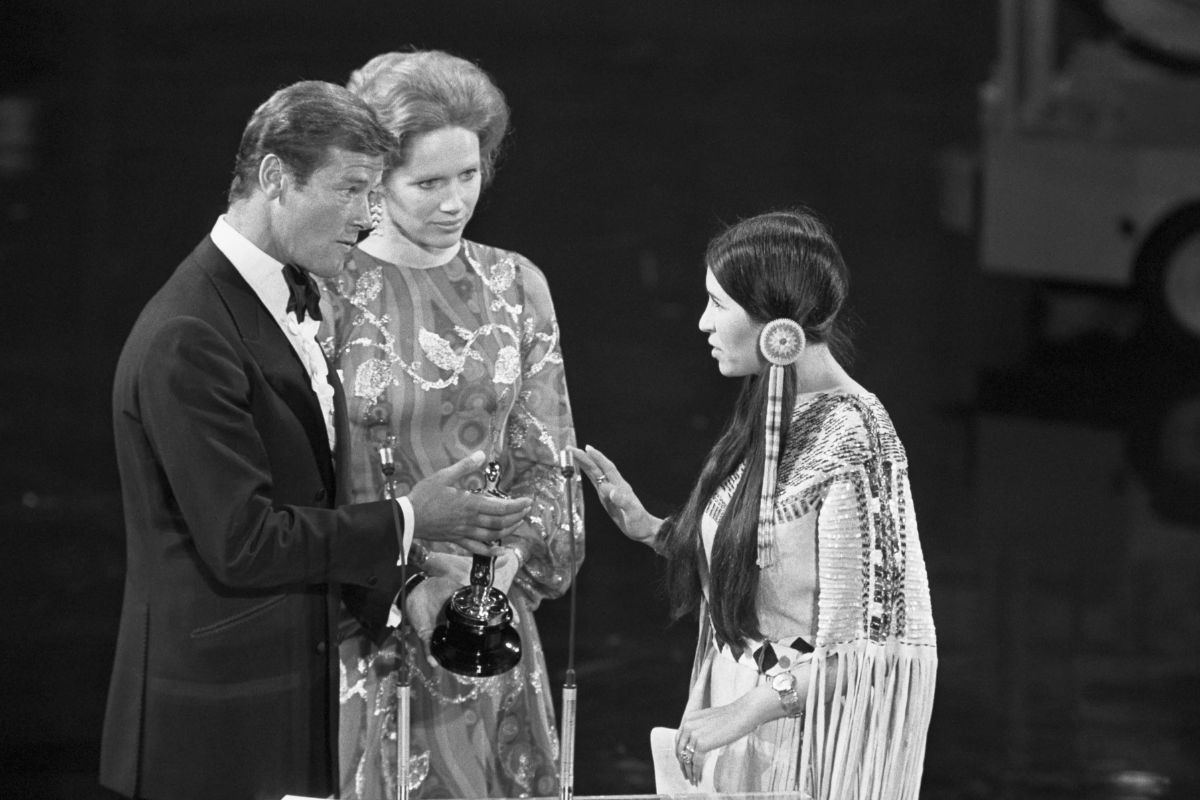Marlon Brando is a complicated man, this much is obvious to anyone living in the twenty-first century. The actor has had quite the eventful life and he has probably upset a few apple carts along the way not the least of which were the majority of his co-stars. However, there was one instance of his anti-establishment behavior that we could get behind: when, in 1973, he was nominated for Best Actor for his eponymous role in The Godfather and he refused the award.
The actor had just emerged from a very trying decade, both professionally and personally, when 1973 rolled around. Brando’s off-screen antics on Mutiny had finally caught up with him and his previous two films had bombed, so he was a pariah in the film industry at this point, not a big enough name to draw in crowds and now notoriously difficult to work with.
There was talk that Brando might not have another job in Hollywood again. With his career seemingly coming to a close, the chance to star in The Godfather may have felt like a last-ditch effort. That was one heck of a curveball. Many actors had their careers made in Hollywood history by the film’s excellent depiction of a New York-based mafia family in the 1940s but Marlon Brando’s performance as The Don stands out.

It would be recognized by both his contemporaries and detractors, restoring what had seemed like an irretrievably damaged reputation. His performance as the seemingly contradictory patriarch—a ruthless and violent criminal desperate to love and protect his family—earned him a Best Actor nomination in 1973 and will live on in infamy.
After The Don won the hearts and minds of Americans, Marlon Brando was the odds-on favorite to win the Academy Award for Best Actor despite stiff competition from Peter O’Toole, Michael Caine and Laurence Olivier (those were the days). Even so, Brando, the true anarchist that he is decided against going.
On the contrary, he declared hours before the ceremony that he would not attend the 45th annual Academy Awards and would instead send a representative in his stead should he win. He promised to dispatch Sacheen Littlefeather, an obscure actress and the head of the Native American Affirmative Image Committee. It was an audacious act with symbolic meaning.
Littlefeather, dressed in full Apache regalia, rose from her seat when Roger Moore and Liv Ullman announced that Brando had won the Best Actor award. Moore went to put the award under Littlefeather’s nose but she waved him away with an open palm. She then stepped up to the podium, faced the audience and began reading from a letter that Brando had written to her that ran 15 pages long.
She said, “I’m here tonight to represent Marlon Brando and he’s asked me to convey his deep regret at being unable to accept this evening’s incredibly generous award. Why? Because of how movies today portray Native Americans. The crowd started booing at this point, obviously offended by the refusal and the audacity to accuse the industry at their celebration.
Unlike anything that would happen in today’s society, the crowd was strongly opposed to this outrageous attempt to disrupt the entertainment industry in the name of racial equality. And on TV in movie repeats and also with recent events at Wounded Knee,” she went on. The stars in attendance were literally and figuratively frothing at the mouth with anger at this display of in their opinion, disrespect.
The events that took place in Wounded Knee, South Dakota saw the federal government engage in armed conflict with Native American activists. Not a pretty sight but not as ugly as the slew of Hollywood actors who were intent on sullying this occasion for free expression. When deciding whether or not to accept the Best Picture award “on behalf of all the cowboys shot in John Ford westerns,” Clint Eastwood had some internal debate.
And that wasn’t the last of it. John Wayne, the legendary actor, stood off to the side of the stage, visibly upset, as the audience booed. “[Brando] should have appeared that night and stated his views instead of taking some little unknown girl and dressing her up in an Indian outfit,” he told the New York Post. Brando’s point was likely confirmed by the fact that many other prominent celebrities had incorrectly stated that Littlefeather wasn’t an Apache by blood.
A 15-page speech Brando gave the day before explaining his decision to speak out now was published in its entirety by The New York Post the following day. Brando claimed that the film industry had as much responsibility as anyone for portraying Indians in a negative light. As it is, growing up in this world is challenging enough for kids. What harm is done to Indian children’s minds when they see stereotypes about their race portrayed in movies?
Look on as Sacheen Littlefeather turns down Marlon Brando’s Best Actor Oscar for The Godfather in 1973.